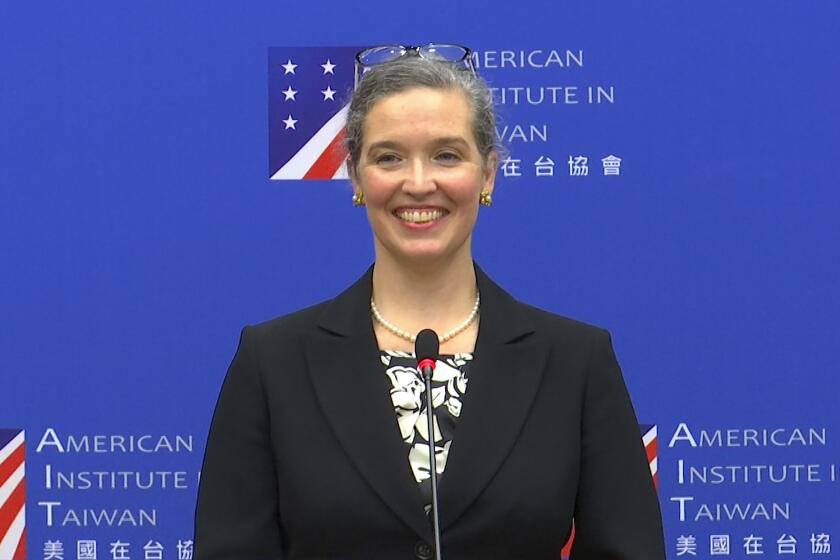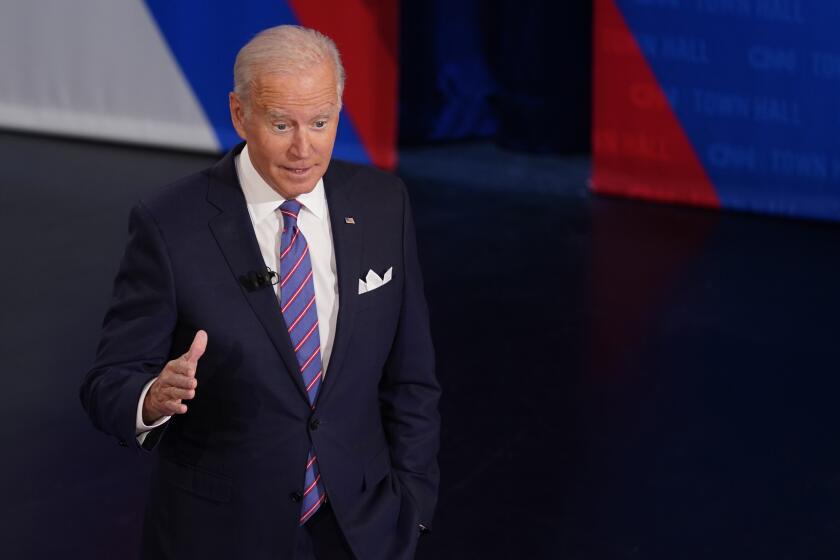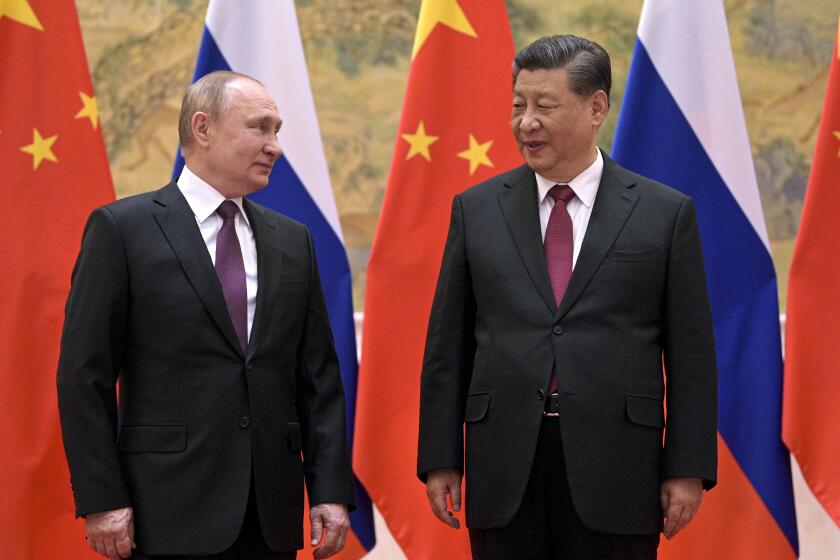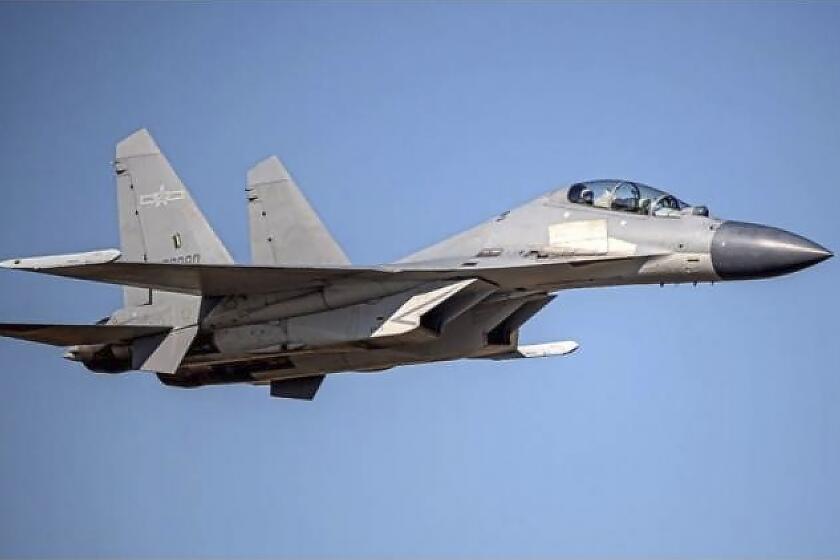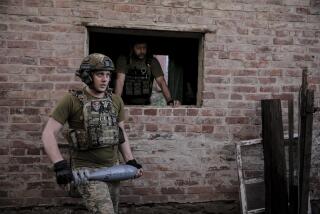Watching Ukraine, Taiwan worries about its own fate
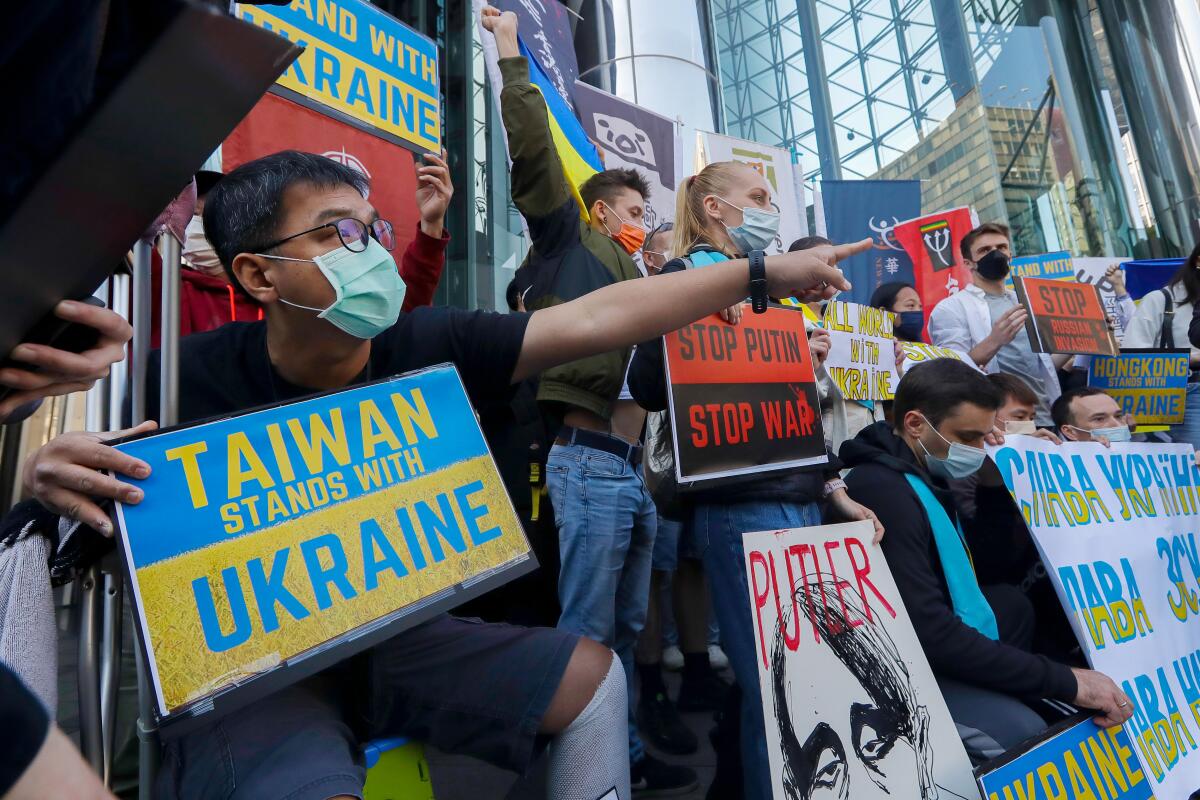
- Share via
TAIPEI, Taiwan — Growing up in Taiwan, Huang Yu-lin has become accustomed to chatter about potential military conflict with mainland China. But it wasn’t until Russia invaded Ukraine that she started to seriously consider what she would do in such a scenario.
“Hearing it so often, it was a bit like crying wolf,” the 32-year-old energy policy researcher said. Now, with a war raging in Europe and deteriorating cross-strait relations, she’s begun looking into medical training and browsing war survival manuals. “I’ve become more and more worried. This is something that needs to be taken seriously,” she said.
For days, the world has been captivated by the invasion of Ukraine, as Russian President Vladimir Putin has sought control of the former Soviet republic’s capital, Kyiv, and ordinary citizens have taken up arms to defend their country. In Taiwan, the apprehension comes with added anxiety over its own precarious geopolitical standing, under the shadow of an aggressive neighbor pushing a territorial claim.
Chinese President Xi Jinping is determined to eventually bring the democratically ruled island back into the Communist Party’s fold. While Beijing has called for peaceful reunification, record incursions by Chinese warplanes into Taiwan’s air defense identification zone are a regular reminder that Xi hasn’t ruled out the use of force.
The U.S. wants to deepen its relationship with democratically ruled Taiwan, which has become a major point of tension in relations with China.
“We feel totally related because of the Chinese Communist Party’s threats to Taiwan every day,” said Chen Kuan-ting, chief executive of Taiwan NextGen Foundation, a think tank politically aligned with the governing Democratic Progressive Party. “We need to invest more in our own national defense, and that is the only way to deter aggression.”
Officials and defense specialists in Taiwan have pointed to Ukraine as a potent warning to step up military training and preparation at home. At the same time, leaders have sought to allay concerns about any imminent threats from China, as well as the island’s defense capabilities.
“Our military is committed to defending our homeland and continues to improve its ability to do so, and our global partners are contributing to the security of our region, giving us strong confidence in Taiwan’s security,” Taiwanese President Tsai Ing-wen said in a statement condemning Russia’s attack on Ukraine.
Experts point to several differences that diminish the likelihood of an imminent attack on Taiwan, an island of about 23 million people. One key factor is the Taiwan Strait, which acts as a natural geographical buffer against mainland forces. Strong diplomatic ties with other democratic governments such as Japan and the U.S., along with Taiwan’s vital role in the global economy and supply chain in semiconductor production, could also help deter aggression.
Beijing insists there is ‘no room’ for compromise or concessions over the issue of Taiwan, which China maintains is part of its rightful territory.
To help preserve the status quo, the U.S. does not formally recognize Taiwan as an independent nation and has been intentionally ambiguous about how much military support it might provide if China attacked the island. As younger generations of Taiwanese develop a stronger sense of identity that sets the island apart from China, some worry that a more defiant stance against unification or an explicit declaration of support from the U.S. could provoke Beijing into action.
Beijing has also stressed the differences between Ukraine and Taiwan, in particular arguing that the latter has always been a part of China.
“It is unwise of certain people of the Taiwan authorities to latch on to and exploit the Ukraine issue to their advantage,” Chinese Foreign Ministry spokeswoman Hua Chunying said in a briefing transcript from last week. “‘Taiwan independence’ only leads to a dead end.”
While many have brushed off fears of confrontation, to others the visceral violence in Ukraine has suddenly made China’s threats much more tangible.
“A lot of scenarios now happening in Ukraine, those were not imaginable for a lot of people,” said T.H. Schee, 44, a tech and policy worker who hosts lectures in Taiwan on civil defense.
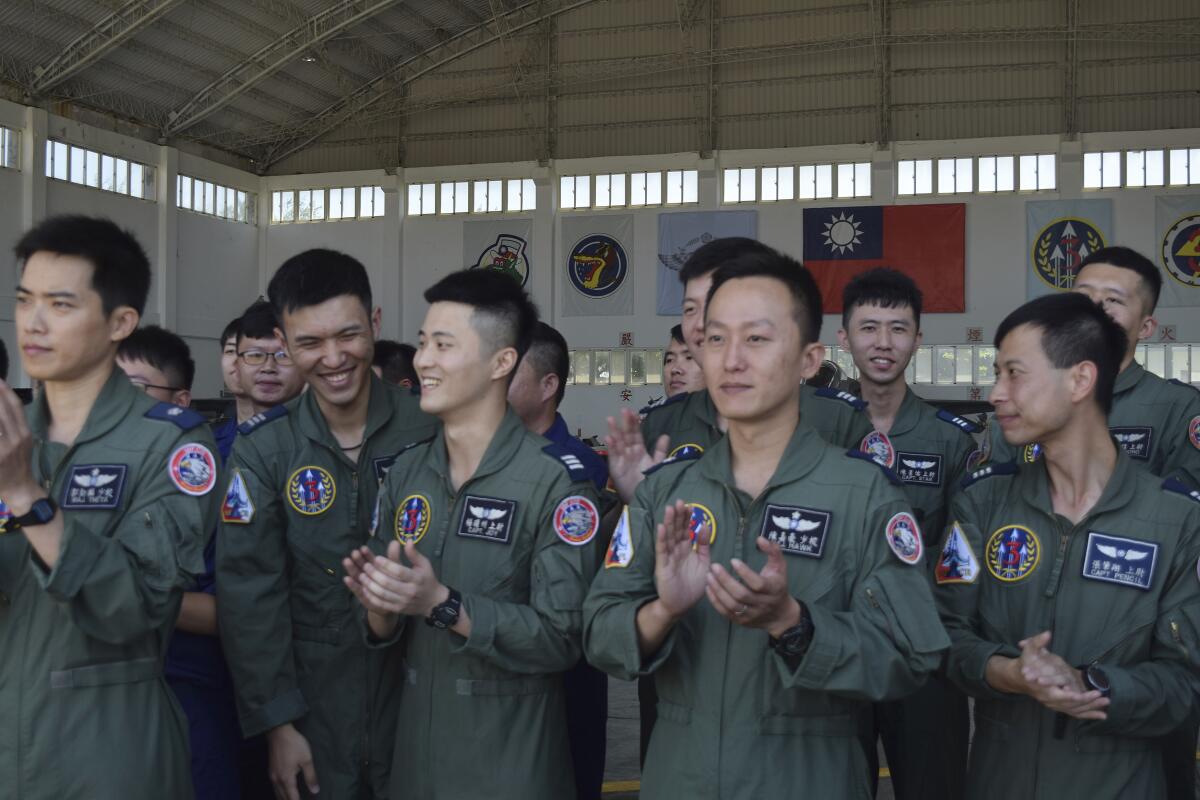
Schee’s events have traditionally focused on natural disaster response, but many recent participants have been drawn to the seminars because of Ukraine. Among the questions he’s received from concerned Taiwanese are whether they can learn to hack computers or shoot rifles, Schee said, despite Taiwan’s strict laws on gun ownership.
“It’s like the Wild West. People have just got no idea what will happen, or what other resources you need,” he said.
Chiang Chia-hung, a master’s student in international relations at National Taiwan University, was pleasantly surprised to find less politically minded friends and family also closely following the news in Ukraine. Even the local shopkeeper raised the issue with him while he was out buying tofu and sausages, during a weekend trip home to the central city of Taichung.
Chiang, who spent two out of his four months of conscription in the Matsu Islands about 10 miles from China’s coast, said he hopes this kind of attention will lead Taiwanese people to take the possibility of outside aggression more seriously.
“There, the risk of China was always present,” he said of his time in Matsu. “Add on these developments, and I feel like it’s made me more aware that you really can’t underestimate the danger of China.”
Beijing denounces a report that it asked Russia to delay invading Ukraine until after the Winter Games concluded Feb. 20. The invasion began Feb. 24.
As Chinese pressure has mounted over the last few years, Taiwan has worked on bolstering national security and defense, including adding billions of dollars in spending to a record defense budget and increasing training for military reservists.
Lai Yu-sheng, a 25-year-old from New Taipei City, said the invasion of Ukraine may boost interest in military affairs or service among younger generations. Given his own health exemption from service, Lai said he plans to get his EMT certification instead. “I want to find other areas I can be ready to help out in,” he said.
Lai and others are still counting on the United States for assistance in the event of a conflict, an assumption that has been tested by America’s messy withdrawal from Afghanistan and a lack of U.S. military support for Ukraine. Military experts agree that Taiwan would be hard-pressed to hold off a full-scale invasion on its own.
“Internationally recognized countries, if they can so easily be invaded like this, then couldn’t Taiwan be too, without any reason?” said Chang Ya-chu, a 21-year-old medical student in Taipei. “We need to work to defend our land ourselves first. Whether others are willing to help us is another matter.”
Amid the heightened debate over the implications for Taiwan, President Biden sent a delegation of former U.S. Defense officials to Taipei this week. “Maintaining peace and stability across the Taiwan Strait is not just a U.S. interest, but also a global one,” former Chairman of the Joint Chiefs of Staff Michael G. Mullen said on arrival in a statement that praised Taiwan’s democracy.
China has flown 52 fighter planes toward Taiwan in its largest show of force on record, continuing a campaign of sustained military harassment.
At antiwar gatherings in Taipei over the weekend, some attendees brought sunflowers, the national flower of Ukraine. The bloom also holds significance for proponents of democracy in Taiwan, stemming from the 2014 Sunflower Movement of student protests against closer trade with China.
Cindy Chang, a 36-year-old Taichung resident, said her deep affinity for Ukraine dates back to that movement, which coincided with tumultuous antigovernment demonstrations in Ukraine.
“At that time, many of the ways that Taiwanese citizens actively spoke to the world were learned from Ukrainian citizens,” she said. “Ukrainians are very brave. I just hope under similar circumstances we can be just as brave as them.”
More to Read
Sign up for Essential California
The most important California stories and recommendations in your inbox every morning.
You may occasionally receive promotional content from the Los Angeles Times.
